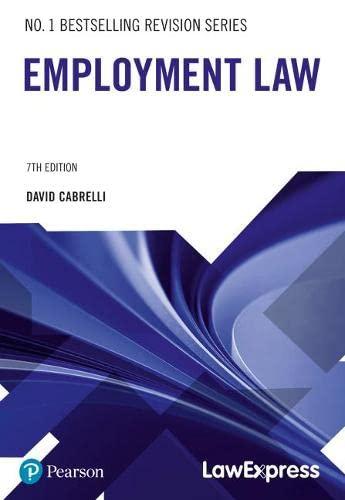Question
Explicitness: Implied Contract Roger's Backhoe Service, Inc. v. Nichols 681 N.W.2d 647 (Iowa 2004) Carter, J. Defendant, Jeffrey S. Nichols, is a funeral director in
Explicitness: Implied Contract
Roger's Backhoe Service, Inc. v. Nichols
681 N.W.2d 647 (Iowa 2004)
Carter, J.
Defendant, Jeffrey S. Nichols, is a funeral director in Muscatine....In early 1998 Nichols decided to build a crematorium on the tract of land on which his funeral home was located. In working with the Small Business Administration, he was required to provide drawings and specifications and obtain estimates for the project. Nichols hired an architect who prepared plans and submitted them to the City of Muscatine for approval. These plans provided that the surface water from the parking lot would drain onto the adjacent street and alley and ultimately enter city storm sewers. These plans were approved by the city.
Nichols contracted with Roger's [Backhoe Service, Inc.] for the demolition of the foundation of a building that had been razed to provide room for the crematorium and removal of the concrete driveway and sidewalk adjacent to that foundation. Roger's completed that work and was paid in full.
After construction began, city officials came to the jobsite and informed Roger's that the proposed drainage of surface water onto the street and alley was unsatisfactory. The city required that an effort be made to drain the surface water into a subterranean creek, which served as part of the city's storm sewer system. City officials indicated that this subterranean sewer system was about fourteen feet below the surface of the ground....Roger's conveyed the city's mandate to Nichols when he visited the jobsite that same day.
It was Nichols' testimony at trial that, upon receiving this information, he advised...Roger's that he was refusing permission to engage in the exploratory excavation that the city required. Nevertheless, it appears without dispute that for the next three days Roger's did engage in digging down to the subterranean sewer system, which was located approximately twenty feet below the surface. When the underground creek was located, city officials examined the brick walls in which it was encased and determined that it was not feasible to penetrate those walls in order to connect the surface water drainage with the underground creek. As a result of that conclusion, the city reversed its position and once again gave permission to drain the surface water onto the adjacent street and alley.
[T]he invoices at issue in this litigation relate to charges that Roger's submitted to Nichols for the three days of excavation necessary to locate the underground sewer system and the cost for labor and materials necessary to refill the excavation with compactable materials and attain compaction by means of a tamping process....The district court found that the charges submitted on the...invoices were fair and reasonable and that they had been performed for Nichols' benefit and with his tacit approval....
The court of appeals...concluded that a necessary element in establishing an implied-in-fact contract is that the services performed be beneficial to the alleged obligor. It concluded that Roger's had failed to show that its services benefited Nichols....
In describing the elements of an action on an implied contract, the court of appeals stated in [Citation], that the party seeking recovery must show:
(1) the services were carried out under such circumstances as to give the recipient reason to understand:
(a) they were performed for him and not some other person, and
(b) they were not rendered gratuitously, but with the expectation of compensation from the recipient; and
(2)the services were beneficial to the recipient.
In applying the italicized language in [Citation] to the present controversy, it was the conclusion of the court of appeals that Roger's' services conferred no benefit on Nichols. We disagree. There was substantial evidence in the record to support a finding that, unless and until an effort was made to locate the subterranean sewer system, the city refused to allow the project to proceed. Consequently, it was necessary to the successful completion of the project that the effort be made. The fact that examination of the brick wall surrounding the underground creek indicated that it was unfeasible to use that source of drainage does not alter the fact that the project was stalemated until drainage into the underground creek was fully explored and rejected. The district court properly concluded that Roger's' services conferred a benefit on Nichols....
Decision of court of appeals vacated; district court judgment affirmed.
CASE QUESTIONS
- What facts must be established by a plaintiff to show the existence of an implied contract?
- What argument did Nichols make as to why there was no implied contract here?
- How would the facts have to be changed to make an express contract?
Step by Step Solution
There are 3 Steps involved in it
Step: 1

Get Instant Access to Expert-Tailored Solutions
See step-by-step solutions with expert insights and AI powered tools for academic success
Step: 2

Step: 3

Ace Your Homework with AI
Get the answers you need in no time with our AI-driven, step-by-step assistance
Get Started


